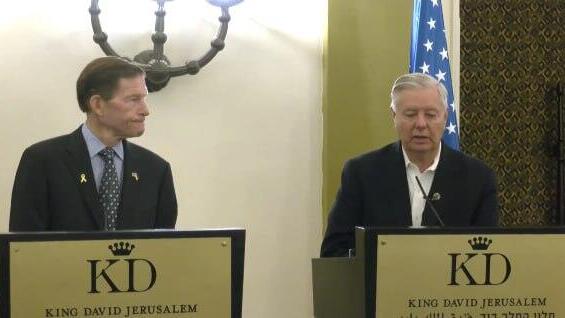Getting your Trinity Audio player ready...
Prominent U.S. Republican Senator Lindsey Graham urged Saudi Arabia and Israel on Tuesday to establish diplomatic ties by the end of the year, warning that the next U.S. administration is unlikely to be able to secure enough votes to support the deal.
“If by Christmas we do not have a normalization between Israel and Saudi Arabia, Iran will have a strategic victory,” Graham said in a press conference from Jerusalem alongside Democratic Senator Richard Blumenthal.
The senators' press conference in Jerusalem
(Video: Gil Yochanan)
The Biden administration is seeking to broker a normalization accord between the two countries that would include U.S. security guarantees for Gulf state Saudi Arabia, among other bilateral deals between Washington and Riyadh.
"We can get you a treaty through the Senate between the United States and Saudi Arabia, a defense agreement like you have in Japan and Australia, if you do it on President Biden's watch," Graham, who is seen as close to Republican presidential candidate Donald Trump, told reporters.
“It has been a constant policy of the U.S. to try to avoid a nuclear-armed Iran… but attacking a nuclear facility right now is, perhaps, not the wisest course to take,” Blumenthal said, adding that further escalation of the war may not be in the best interests of Israel and the U.S. interests.
“I don’t know what targets Israel will pick, but I know it will respond,” Graham said. “Missile defense worked very well, but eventually one will get through and kill Israelis. It’s just a matter of time, and that would trigger a massive response.”
Democrat Joe Biden's term as president will end on Jan. 20. Graham, a longtime senator, is a key Republican in Congress with influence on foreign policy and national security matters.
Graham, who met Israeli Prime Minister Benjamin Netanyahu on Monday, said he would travel to Saudi Arabia to meet de facto ruler Crown Prince Mohammed bin Salman, and to the United Arab Emirates for talks with President Mohammed bin Zayed Al Nahyan. The UAE established relations with Israel in 2020 as part of the so-called Abraham Accords.
Saudi officials, including Prince Mohammed, have discussed potentially establishing ties with Israel but over the past year insisted that it include at least the pathway to a Palestinian state, a markedly steeper challenge since the Gaza war erupted.
Israeli-Saudi normalization could open the door to many other Arab and Muslim-majority nations forging ties with Israel and thus bolstering regional stability, given Riyadh's sway in the Muslim world as home to Islam's two holiest sites in Mecca and Media.
Rocket interceptions above Israeli cities
(Video: Shalev Shalom, Yaron Brener, Gil Yochanan, Gil Nechoshtan, Yair Sagi, Amit Shabi, Arnon Busani, Aviv Lashem, Maxim Oknin)
Two-state solution 'dead'
But even before the October 7, 2023 attack on Israel by Gaza's ruling Hamas terrorists that triggered the war, Netanyahu's right-wing government had rejected a "two-state solution" to the conflict with the Palestinians.
Graham said the two-state solution - an independent Palestinian state alongside Israel - had been "dead" ever since the cross-border assault by Hamas gunmen, who killed about 1,200 people and took around 250 hostage a year ago.
"The Israeli public will not accept a Palestinian state as a result of this barbaric terrorist attack, because it's rewarding terrorism. I get that," Graham said, but he added Israel could work with Riyadh, along with the UAE, on the Palestinian file.
Riyadh has repeatedly called for an end to the war and said the two-state solution and regional stability are interdependent.
Netanyahu has said that establishing diplomatic ties with Saudi Arabia would lead to a "historic reconciliation" between Arab states and Israel, and between Islam and Judaism and vowed to pursue an accord. Israel has diplomatic ties with a few Arab or Muslim-majority states including the UAE, Egypt, Jordan and Morocco.
Get the Ynetnews app on your smartphone:







